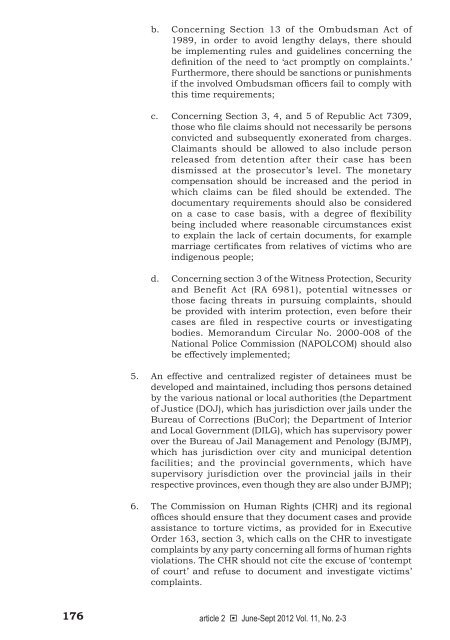Create successful ePaper yourself
Turn your PDF publications into a flip-book with our unique Google optimized e-Paper software.
176<br />
b. Concerning Section 13 of the Ombudsman Act of<br />
1989, in order to avoid lengthy delays, there should<br />
be implementing rules and guidelines concerning the<br />
definition of the need to ‘act promptly on complaints.’<br />
Furthermore, there should be sanctions or punishments<br />
if the involved Ombudsman officers fail to comply with<br />
this time requirements;<br />
c. Concerning Section 3, 4, and 5 of Republic Act 7309,<br />
those who file claims should not necessarily be persons<br />
convicted and subsequently exonerated from charges.<br />
Claimants should be allowed to also include person<br />
released from detention after their case has been<br />
dismissed at the prosecutor’s level. The monetary<br />
compensation should be increased and the period in<br />
which claims can be filed should be extended. The<br />
documentary requirements should also be considered<br />
on a case to case basis, with a degree of flexibility<br />
being included where reasonable circumstances exist<br />
to explain the lack of certain documents, for example<br />
marriage certificates from relatives of victims who are<br />
indigenous people;<br />
d. Concerning section 3 of the witness Protection, Security<br />
and Benefit Act (RA 6981), potential witnesses or<br />
those facing threats in pursuing complaints, should<br />
be provided with interim protection, even before their<br />
cases are filed in respective courts or investigating<br />
bodies. memorandum Circular no. 2000-008 of the<br />
national Police Commission (nAPOLCOm) should also<br />
be effectively implemented;<br />
5. An effective and centralized register of detainees must be<br />
developed and maintained, including thos persons detained<br />
by the various national or local authorities (the Department<br />
of Justice (DOJ), which has jurisdiction over jails under the<br />
Bureau of Corrections (BuCor); the Department of Interior<br />
and Local government (DILg), which has supervisory power<br />
over the Bureau of Jail management and Penology (BJmP),<br />
which has jurisdiction over city and municipal detention<br />
facilities; and the provincial governments, which have<br />
supervisory jurisdiction over the provincial jails in their<br />
respective provinces, even though they are also under BJmP);<br />
6. The Commission on human Rights (ChR) and its regional<br />
offices should ensure that they document cases and provide<br />
assistance to torture victims, as provided for in Executive<br />
Order 163, section 3, which calls on the ChR to investigate<br />
complaints by any party concerning all forms of human rights<br />
violations. The ChR should not cite the excuse of ‘contempt<br />
of court’ and refuse to document and investigate victims’<br />
complaints.<br />
article 2 � June-Sept 2012 Vol. 11, No. 2-3


